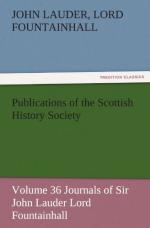[17] ’Sir John Lauder
of Fountainhall is deschended of the Lauders of
that
ilk, and his paternall coat is immatriculate and registrate
in
the Lyons Book of Herauldrie.’—Unprinted
MS. by Lauder, in
possession
of Sir T.N. Dick Lauder. A Genealogical Roll
in MS., of
the
Lauder Family, compiled by Sir T. Dick Lauder, also
in the
present
baronet’s possession, has afforded much useful
information;
and for Lauder’s family connections, I have also
consulted
Mrs. Atholl Forbes’s Curiosities of a Scottish
Charter
Chest,
and Mrs. Stewart Smith’s Grange of St. Giles.
[18] See Appendix III.
The following estimate of his character in Forbes’s Preface to the Journal of the Session (1714), a rare book, is quoted by Mr. Laing, but is too much in point to be omitted here. ’The publick and private character of this excellent judge are now so well known that I need say no more of him than that he signalized himself as a good patriot and true Protestant in the Parliament of 1686 in defence of the Penal Laws against Popery. This self-denyed man hath taken no less pains to shun places that were in his offer than some others have been at to get into preferment. Witness his refusing to accept a patent in the year 1692 to be the King’s Advocate, and the resigning his place as a Lord of Justiciary after the Union, which Her Majesty with reluctancy took off his hand. In short, his lordship is (what I know by experience) as communicative as he is universally learned and knowing. He hath observed the decisions of the Session from November 1689 till November 1712, which I have seen in Manuscript; but his excessive modesty can’t be prevailed on to make them publick.’
There are no materials for expanding Mr. Laing’s sketch of Fountainhall’s life, except in so far as the notes of his travels and his expeditions into the country, and the accounts, here printed, give some glimpses of his habits and his domestic economy in his early professional years. He lived in troubled times, but his own career was prosperous and comparatively uneventful. The modesty which Professor Forbes truly ascribes to him disinclined him to take a part, as a good many lawyers did, in public affairs, except for a short period before the Revolution, as a member of Parliament; and, together with his prudence and strong conscientiousness, preserved him from mixing in the political and personal intrigues which were then so rife in the country. The same modesty is apparent in his writings in mature life to a tantalising degree. It may not be so conspicuous in his boyish journal, when he was ready enough to throw down the gauntlet in a theological discussion; but in the later voluminous MSS., when even dry legal disputes are enlivened by graphic and personal touches, the author himself rarely appears on the scene. We miss the pleasant details of Clerk of Penicuik’s




